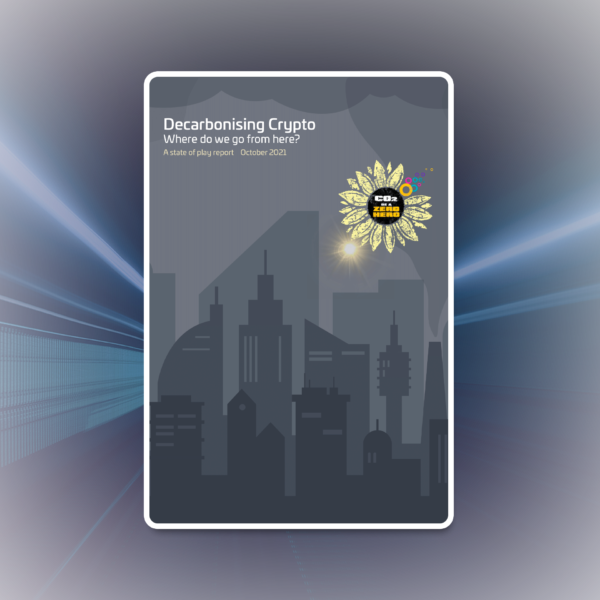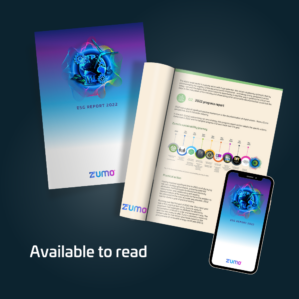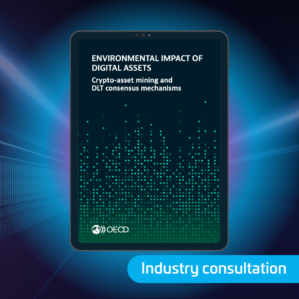
A recommended first read for those looking for an overview introduction to the decarbonising crypto debate.
Kicking off the Zumo Decarbonising Crypto report series, our 2021 state of play report united expert voices from across the sector to gather opinions and perspectives from solutions providers, industry participants and environmental research on key questions of methodology, benchmarking, collaboration and technology.
The goal: get to the facts of the polarised crypto decarbonisation discussion and provide the common base of understanding and shared point of departure for reasoned, nuanced discussions of the topic.
Decarbonising Crypto: Insights from stakeholder engagement
Meaningful progress on the increasingly high-profile challenge of decarbonisation in the crypto sector will be achieved only through collaboration, collective action and open, objective dialogue.
Held by Zumo in partnership with the Crypto Climate Accord, the ‘Decarbonising crypto’ stakeholder round-table gathered input from leading sustainability researchers and cryptocurrency experts, including The Cambridge University Centre for Alternative Finance, The Green Bitcoin Project, The Digiconomist and TAAL Distributed Information Technologies, on the following key areas of debate:
Methodology: How do we gauge cryptocurrencies’ environmental impact, and how the problem is defined?
Benchmarking: Looking across and beyond sectors, how do we frame the issue and talk about it productively against the backdrop of a wider societal debate?
Collaboration: What will be required of the industry as a whole to make meaningful progress on decarbonisation, and how best does it direct its efforts in doing so?
Technology: how does ongoing technology development in the crypto space impact the discussion, now and in the future?
Building directly on this discussion, the ‘state of play’ report is one of the first to comprehensively deconstruct the methodologies and assumptions quantifying the environmental impact of cryptocurrencies, offering a snapshot insight into the key parameters of the rapidly evolving crypto climate debate.
The state of play: Key takeaways
- Not all crypto is the same. Bitcoin has far and away the biggest carbon footprint, making it the area of first priority for quantifying and mitigating environmental impact.
- As purely digital assets built on publicly auditable blockchains, cryptocurrencies have key advantages of transparency of data and defined energy inputs – making them comparatively easy to decarbonise.
- The first practical step is to align on the methodologies the industry is using to quantify environmental impact. In the case of Bitcoin, Zumo has contributed to two methodologies and evaluated several others, as presented in the table below.
- Meaningful progress will require collaboration across the sector. Zumo is committed to sharing its findings publicly and transparently, and will continue to feed into pivotal cross-sector initiatives such as the Crypto Climate Accord that bring in all ecosystem participants – miners, platforms, and crypto holders / investors.
- Greening of cryptocurrencies aligns naturally with market incentive and the advancement of the space. Investors demand it, and Environmental, Social and Governance (ESG) will feature prominently in the next stage of crypto’s evolution.
- Emerging low-energy-consumption blockchain technology will transform the way we view cryptocurrencies and their energy consumption as the space develops in application and infrastructure. Increasingly, this will extend to direct leveraging of the benefits of blockchain in transparency, accessibility and audit as a tool for good in tackling the climate change challenge.
A full copy of the report is available to download here.
What next?
Recognising Bitcoin as the network with the most significant environmental impact, Zumo will be using Zero – a blockchain-based technology from Energy Web, one of the three founding organisations of the Crypto Climate Accord – to purchase and verify 100% renewable energy certificates for all Bitcoin purchases on the Zumo app.
The pilot project – Zero Hero – ran for an initial trial period of three months, the findings and methodology are available in the newly launched Decarbonising crypto – towards practical solution Report, and outline the next steps in the space.
The project sat within our net zero strategy, Zumo Zero, that aims to actively reduce Zumo’s carbon footprint across all operations with an ambitious target of net zero by 2030.
The three-pillar strategy takes a holistic view of the decarbonisation imperative, encompassing not only the company’s own carbon footprint, but the carbon footprint of the blockchains Zumo works with and the wider ecosystem too.

















